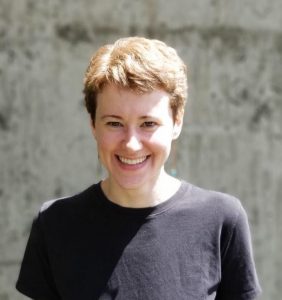 This Student Spotlight series highlights the course experiences of students in the Incarceration & Health Course taught by Dr. Rebecca J. Shlafer. Other parts of the series include reflections from: Bri Warren, Hannah McNamee, Jeanette Fernandez-Baca, and Rachael Mills. The following piece is a reflection written by Martha Johnson about her MCH experiences and what she learned in the course.
This Student Spotlight series highlights the course experiences of students in the Incarceration & Health Course taught by Dr. Rebecca J. Shlafer. Other parts of the series include reflections from: Bri Warren, Hannah McNamee, Jeanette Fernandez-Baca, and Rachael Mills. The following piece is a reflection written by Martha Johnson about her MCH experiences and what she learned in the course.
I began the Master of Public Health program at the University of Minnesota (UMN) in the fall of 2017, excited to study wellness through the broad, preventive lens of public health. I hoped to understand the risk factors associated with incarceration and help identify ways to mitigate them. Although my interest in incarceration has not wavered, the opportunities I have had in the Maternal and Child Health Program have helped me rethink the ways in which I hope to work with populations at risk for incarceration.
About the Project and the Curriculum
This past summer, I spent a June week in Dr. Rebecca Shlafer’s Parental Incarceration and Child Welfare course through the University of Minnesota’s Summer Public Health Institute. The class was as fascinating as it was heartbreaking, offering a glimpse into the difficult systems that incarcerated parents must navigate to retain or regain parental rights. As the course progressed, I rewrote my internal narrative about parents involved in the child-protection system and came to recognize their circumstances as a product of intergenerational disadvantage. This understanding—coupled with the growing public-health consensus indicating that children raised by their families achieve superior outcomes—ignited my passion to advocate on behalf of child-protection-involved families.
One of our guest speakers in Dr. Shlafer’s course was Joanna Woolman, director of the Child Protection Clinic at Mitchell Hamline School of Law. Hearing about her experiences fighting to keep families together introduced an opportunity to directly confront a system that I now believed disadvantaged the very populations it should serve. Excited by the prospect of providing legal counsel to marginalized families, I made plans to become a family-defense attorney.
My Role in the Project
This past fall I enrolled in Dr. Shlafer’s course entitled Mass Incarceration and Public Health: An American Crisis, which included both undergraduate and graduate students. To enrich the opportunity for graduate students, Dr. Shlafer provided an opportunity to revise a women’s health curriculum, generously provided by Rush University Medical Center, and facilitate the material at the Minnesota Correctional Facility in Shakopee. A group of seven graduate students, including myself, spent the fall semester developing the material and began presenting in January to an enthusiastic group of women at the prison. This semester I have helped facilitate two sessions, one addressing STIs and the other discussing mental health. The opportunity to make connections with these women and hear some of their stories and ideas has been invaluable and seeing their vulnerability and dedication to learning has been inspiring. Working closely with incarcerated women has been extremely rewarding and has reinforced my desire to work directly with the populations I hope to serve.
What I’ve Learned
My education at the UMN’s School of Public Health has equipped me to identify the ways in which suffering is transmitted from one generation to the next. Current research in child health shows overwhelmingly that children experience optimal health outcomes when raised by family members. Yet the common practice of familial separation perpetuates transgenerational trauma and punishes children for their parents’ alleged actions. I intend to fight these injustices by steeping my study and practice of the law in public health principles. My understanding of social determinants will inform my advocacy and encourage a zealous approach to representation for parents facing separation from their children. I intend to use my training in public health to identify points of early intervention and promote reforms that apply a rehabilitative response to child-protection cases. By completing the joint JD/MPH degree through the University of Minnesota, I hope to develop a holistic approach to my legal advocacy.
Future Opportunities
I was admitted to Mitchell Hamline School of Law this November and will begin classes in the fall of 2019. The combined study of both law and public health will foster a unique perspective and method in my future career as a family-defense attorney. As a student at Mitchell Hamline, I will gain a comprehensive legal education that will provide me the opportunity to exercise my passion by completing the Child Protection Clinic and prepare me to fiercely advocate on behalf of my clients. At the same time, my public-health background will allow me to understand and explain the circumstances that disadvantage my future clients, encouraging an empathetic and vigorous approach to defending families.
Martha earned her Bachelor of Arts in Art History from the University of Minnesota, Morris. She is now enrolled in the Public Health Law (JD/MPH) program, with plans to become a family defense attorney.
Read Student Spotlight Archives
Interested in learning more about getting a degree in Maternal and Child Health? Visit our MCH Program page for more information.
#UMNMCH #UMNproud #UMNdriven